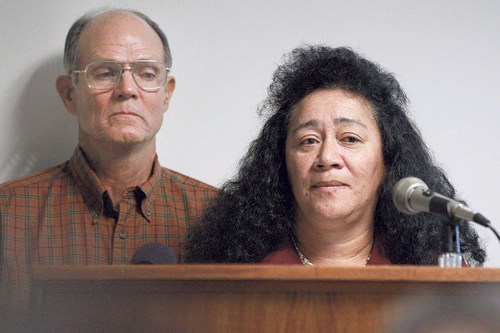Niihau owner wants nonresident fishermen banned

Leiana Robinson spoke during a news conference Wednesday at the state Capitol to call for a no-fishing zone around the island of Niihau for nonresidents. Her husband, Bruce Robinson, the island’s owner, stood behind her.
Nonresident fishermen have depleted the fish supply that Niihau residents depend on to survive, Bruce Robinson, the island’s owner, said Wednesday.
"Over 100 years ago, a king asked our family to take care of the people," said Robinson, who choked back tears and paused to regain his composure. "We are here today for that fulfillment of that promise. Over the years, we’ve been able to hold the line at Niihau. It’s the last culture left in Hawaii."
In a rare visit to Oahu, Robinson, and his wife, Leiana, accompanied by a group of fellow Niihau residents, spoke during a news conference at the state Capitol held on the eve of Thanksgiving to address the sharp decline of nearshore fish and the adverse impacts on the ecosystem.
They said their trip reflected the gravity of the issue and put out a call to the state and lawmakers for assistance. In response to their concerns, the state Legislature and the Department of Land and Natural Resources will consider establishing rules to protect the island’s resources and the Native Hawaiian culture.
Lawmakers plan to introduce legislation in January to establish a no-fishing zone around the island for outsiders and to reserve nearshore fishing solely to the people of Niihau. DLNR is also working on administrative rules to protect the island’s resources and culture.
During the news conference, Robinson first spoke in Hawaiian and then in English. For more than 25 years, the people have noticed the drop of nearshore fish, he said, adding that outsiders also take opihi on the shoreline.
Don't miss out on what's happening!
Stay in touch with breaking news, as it happens, conveniently in your email inbox. It's FREE!
But the island is battling problems caused by outsiders involving overfishing and commercial tour boats sailing nearby to get a glimpse of Niihau, Robinson said.
Photos and short videos were shown during the news conference of fishermen taking opihi.
The people of Niihau cannot survive without essential resources that is being taken by outsiders, Robinson said.
Leiana Robinson said: "It’s (overfishing has) got to stop. It has to stop. If we don’t do something about it, then we won’t exist."
Niihau is referred to as "The Forbidden Island" because entry to the island is only by invitation from the Robinson family. About 100 Native Hawaiians live on the island. Hawaiian is the official language.
Residents live a simple life. There are no grocery stores or running water. The population is dependent on natural resources such as water caught by catchment.
Bruce Robinson’s great-great-grandmother, Eliza Sinclair, bought Niihau in 1864 for $10,000 in gold from King KamehamehaIV.
After the conference, Robinson said fish around the island have been depleted by two-thirds over the years. In early years, fishing was conducted in a systematic way to maintain the balance of the ecosystem and sustainability for the Native Hawaiian population who reside on the island. What off-island fishermen are doing is wrong, he said.
Lawmakers are discussing the range of the no-fishing zone within state waters that stretch 3 miles from the shoreline. Sen. Clayton Hee said at the news conference that he and other lawmakers want the zone to be as wide as possible.
DLNR Director William Aila, who also was at the news conference, said the agency is working on a series of administrative rules to strike a balance to provide protection for Niihau. Rules will likely include regulations on bag limits, equipment prohibition and penalties. The process to establish rules will take about six to eight months.
An attempt to implement regulations on fishing at Niihau during the Linda Lingle administration occurred after her visit to the island, but for unknown reasons the process didn’t progress.
Not only does the state want to protect its resources but also the sanctity of the island’s culture and population, who want to maintain their purity from outside influences, Aila said.
Protection is vital for Niihau’s resources and culture, Aila stressed. "Niihau is such a unique subset of the Hawaiian culture that it absolutely needs protection."




